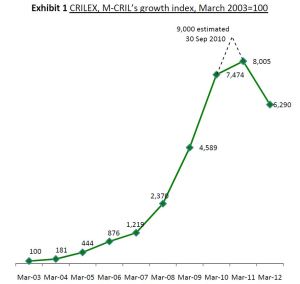You are currently browsing the tag archive for the ‘financial governance’ tag.
The Andhra Pradesh crisis has been something of a turning point in public assessment of microfinance, with a suicide wave caused by widespread overindebtedness badly tarnishing the sector’s image in India as well as abroad. Some Indian politicians are now beginning to identify the idea of alleviating poverty with microfinance as “crap“.
Source: M‐CRIL Microfinance Review 2012 (vii)
Microfinance in India remains in protracted decline since 2010 (see graph), although talk of “green shoots” and catharsis after “near-death experience” has been around for some time. The industry’s stance for the past two years has been to deny responsibility for any wrongdoings, downplay its role in precipitating the dozens of suicides, and claim that the AP government’s October 2010 legislation was a surprising and unjust crackdown on healthy practices. I have claimed otherwise.
Yet, fairly surprisingly, my new paper investigating the causes of the crisis, and a recent interview with SKS Microfinance senior managers come to some similar conclusions about the causes. In particular, both versions see the unregulated hyper-competitive market as a significant cause of the tragedy which led to microfinanciers’ troubles. How can this be?
Isabelle Huault and Christelle Richard (eds.), 2012: Finance: The Discreet Regulator: How Financial Activities Shape and Transform the World. Basingstoke: Palgrave Macmillan.
The power of financial markets and financial actors over economies and societies is as hard to deny as it is to conclusively prove. From subprime mortgages to Greek debts to microloans, different people and different sectors all feel it in their own ways. “Financialisation” (Epstein, Krippner), “finance-led growth regime” (Boyer), “financial market capitalism” (Windolf) represent only some of the attempts to come to grips with this sea change; but none have provided decisive answers as to the “why” and “how”.
A new book proposes seeing finance (in the tradition of the French “Régulation School”) as a type of regulator – a subtle, insidious one. “Finance: The Discreet Regulator: How Financial Activities Shape and Transform the World” collects perspectives on how “financial markets are the seat of regulatory processes initiated and developed by core-capitalist financial institutions such as banks and audit firms”. Read the rest of this entry »



